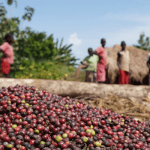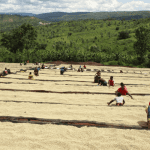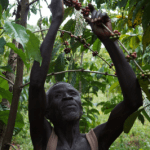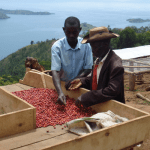Farmer Cooperative Promotes Education, Nutrition and Prosperity
On a farm in the northern Nicaraguan town of Chagüite Grande, Melvin Estrada tends to his cabbage crop. He and his hired workers pick the plants, inspect them for quality and load them into a truck bound for a local collection center – and eventually a major supermarket.
Melvin used to earn an average of five cordobas – about 20 cents – from each cabbage plant. After joining the Tomatoya-Chagüite Grande cooperative about five years ago, he learned more effective production practices and gained a reliable market for his crop. He now earns 12 cordobas per cabbage, double what he used to receive.
The extra income has helped Melvin buy medicine and nutritious food, improve his home and send his 10-year-old son to school.
“An education is the best inheritance he can receive,” Melvin says.
With TechnoServe’s assistance, and with support from the U.S. Agency for International Development and Catholic Relief Services, farmers in the small communities of Tomatoya and Chagüite Grande have turned their cooperative into a successful business. They have learned to grow superior produce and become a competitive supplier in the national market. As a result, their cooperative is growing and creating new prosperity in the communities.
These benefits spread through families and ripple from household to household. As the example of Tomatoya and Chagüite Grande shows, a strong agricultural industry helps strengthen the foundation of tight-knit rural communities across the world.
Not far from where Melvin harvests his crop, his sister, Fatima del Rosario Estrada, keeps a watchful eye on her youngest son and granddaughter as she stirs a pile of rice husks in her backyard. The husks, mixed with soil and vegetable scraps, roast over low heat in order to produce compost. Fatima can roast as many as 240 bags in a month, earning $1 per bag. The extra income helps her buy clothing, shoes and better food for her family.
“We use to eat just beans and cheese,” Fatima says. “Now we also have pasta, rice, meat, chicken and vegetables.”
Soon Fatima’s husband, Denis Chavarria, arrives home after a day in the fields. Like many of the farmers in the area, Denis began using better seeds and technologies such as drip irrigation after TechnoServe business advisors demonstrated their benefits.
The farmers also began staggering their planting so they could harvest 24 times a year, instead of just two. These improvements allowed the farmers to meet the quality standards and year-round demand of La Colonia, a national supermarket chain that TechnoServe helped link with the Tomatoya-Chagüite Grande cooperative.
As the cooperative has grown, so has its economic impact in the region. Denis and Fatima’s eldest daughter, Anielka Chavarria, 22, works nearby in a greenhouse, one of 18 cooperative-owned nurseries that produce 800,000 high-quality seedlings each month. Anielka and the other employees – many of them sons and daughters of cooperative farmers – plant seeds and raise small plantulas that have helped farmers boost their productivity. For Anielka, a single mother, the job provides income and financial independence.
At the cooperative’s headquarters and collection center, the product of all this hard work comes together. Employees wash and bulk produce from the 38 members of the cooperative, along with 25 other area farmers.
The cooperative’s trucks deliver the vegetables to its customers. The board of directors and administrative staff connect with buyers and organize production schedules to ensure the farmers are meeting market demands. This business employs 26 people and generated $845,000 in sales last year.
Beyond its economic impact, the cooperative has installed clean water systems for 118 families in the community and helped provide electric power to the local school. Efrén Rizo, the president of the cooperative’s board of directors, says the standard of living and education level in the area have improved as the cooperative has grown.
Efrén himself has two children who have earned college degrees. He is proud that he could provide his children with an education he never received. Thanks to the hard work of Efrén and his fellow farmers and businesspeople, Tomatoya and Chagüite Grande are discovering that economic opportunity is a gift to future generations.






